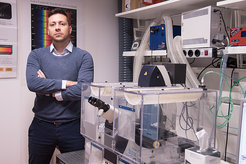Constantinos Demetriades Receives The Walther Flemming Award
Awarded for outstanding achievements in Cell Biology research
Constantinos Demetriades, head of the Max Planck Research Group ‘Cell Growth Control in Health and Age-related Disease’ at the Max Planck Institute for Biology of Ageing, is the recipient of the 2019 Walther Flemming Award from the German Society for Cell Biology (DGZ).

The German Society for Cell Biology (DGZ) grants a research award named after Walther Flemming, one of the pioneers of cell biology research. In 1875, he provided us with a detailed description of processes during cell division, which he named mitosis. The Walther Flemming Award is awarded annually to researchers up to an age of 38 years for outstanding scientific merits from all fields of cell biology research. Applications and nominations are reviewed by an independent commission of the DGZ.
Dr. Demetriades was awarded the 2019 Walther Flemming Award for his work elucidating how cells respond to nutrient starvation and how information from multiple cellular stresses is integrated to regulate cellular physiology. “I would like to thank the DGZ selection committee for honoring me with this award”, Constantinos says. “It is extremely motivating for a scientist to see that his research is being recognized and appreciated by his peers, especially because this award comes from renowned cell biology experts.”
The award ceremony took place at the joint GBM/DGZ Fall Conference 2019, held on September 25-27 in Tübingen, where Dr. Demetriades delivered the Walther Flemming Award talk. The award is accompanied by a prize sponsored by the European Journal of Cell Biology.
Walther Flemming (1843 – 1905), the father of Cell Biology
The German biologist is considered the founder of cytogenetics. Born in 1843 in Sachsenberg, he studied medicine at the University of Prague. In 1876, he became a Professor of Anatomy at the University of Kiel, where he stayed until the end of his life. Using fins and gills of salamanders, Flemming was the first to observe and describe chromatin and chromosomes in the cell nucleus and investigated the process of cell division and mitosis. On the basis of his pioneering discoveries, Flemming coined the phrase omnis nucleus e nucleo (all cell nuclei came from another predecessor nucleus).
According to the Science Channel, Flemming’s discovery of mitosis and chromosomes is among the 100 most important scientific discoveries of all time, and among the 10 most important discoveries in cell biology. In addition to his contributions in science, Flemming was also famous for his work as a philanthropist: He fed the homeless, donated one fifth of his yearly salary to support homeless shelters, and taught mathematics and science to young children that were too poor to afford school. The German Society for Cell Biology honors his name with the Walther Flemming Award.
The awardee
Dr. Demetriades obtained his Biology Degree from the Aristotle University of Thessaloniki, and pursued his PhD at the Biomedical Sciences Research Center ‘Alexander Fleming’ in Athens, and the Aristotle University of Thessaloniki, Greece. He then joined the lab of Aurelio Teleman at the German Cancer Research Center (DKFZ) in Heidelberg, Germany as a Postdoctoral Researcher. Since January 2017, Dr. Demetriades is a Max Planck Research Group Leader at the Max Planck Institute for Biology of Ageing in Cologne, Germany. In November of the same year he won the Starting Grant of the European Research Council.












